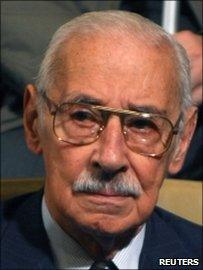Videla trial opens in Argentina
- Published

Jorge Videla ruled the country from 1976 to 1981
Former Argentine military ruler Jorge Videla has gone on trial for the murders of more than 30 political prisoners in 1976.
The 84-year-old, who is already serving a life sentence for abuses committed during military rule, is one of more than 20 defendants.
A presidential pardon given to him in 1990 was recently overturned by the supreme court.
Up to 30,000 people were tortured and murdered between 1976 and 1983.
As the head of the military junta until 1981, Videla is considered to have been the main architect of what became known as the "Dirty War".
The case now being heard relates to the killing of a group of left-wing activists who were taken from their jail cells in the central city of Cordoba and shot dead shortly after the military took power.
The army said at the time that they were killed while trying to escape.
Convictions restored
Now 84 and with prostate cancer, Videla was sentenced to life in prison for torture, murder and other crimes in 1985 when many of Argentina's military leaders were tried for human rights abuses.
He was pardoned in 1990 under an amnesty given by the president at the time, Carlos Menem.
In April the supreme court upheld a 2007 federal court move to overturn his pardon, restoring Videla's convictions and clearing the way for other new cases against him.
Since he is already serving a life sentence, any new conviction will not mean more years of prison, the BBC's Candace Piette reports from Buenos Aires.
But the prosecution hopes the trial in Cordoba will bring some relief to the families of the dead, our correspondent says.
World Cup cover
The families of the victims are being represented by Miguel Ceballos, a lawyer whose father was among those killed.
"When they came looking for my father at the prison, he knew he would be killed," he said.
"He said goodbye to his friends and left a photo of his family so they could tell us what happened."
During his five-year administration, Videla organised the 1978 World Cup in Argentina.
Argentina's victory was used to try to clean the international reputation of the military government at a time when reports of massive human rights violations had been seeping out, our correspondent says.
Videla also faces charges in Italy, Spain France and Germany for the murder of some of their citizens in Argentina.